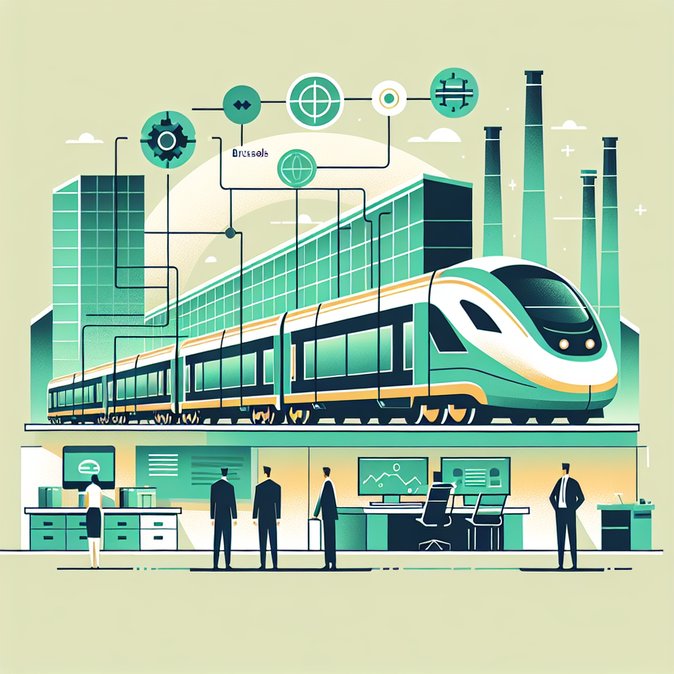
Eurostar, the Franco-Belgian-Dutch-British high-speed operator headquartered in Brussels South Station, signed a €2 billion contract with French manufacturer Alstom on 22 October 2025 for 50 next-generation Avelia Horizon trainsets. The deal marks the first time Eurostar will introduce double-deck equipment on its Channel Tunnel corridor and continental routes, raising seat capacity from 389 to 540 per train. Delivery of the first six units is scheduled for May 2031, with a further 24 arriving by January 2032 and the remainder by 2034.
According to CEO Gwendoline Cazenave, the order is central to Eurostar’s strategy of carrying 30 million passengers a year by 2030, up from 19.5 million in 2024. Each 200-metre set will run at up to 300 km/h and be fully interoperable across the United Kingdom, France, Belgium, the Netherlands, Germany and Switzerland. They will consume 20–50 % less energy thanks to regenerative braking, lightweight bogies and a streamlined nose tailored to the Channel Tunnel’s aerodynamics.
The trains’ interior has been co-designed with accessibility groups in Belgium and the UK. A low-floor entrance, wider aisles and two wheelchair spaces per coach meet the Brussels-Capital Region’s 2024 accessibility decree, while bicycle racks respond to EU sustainability targets. Eurostar confirmed that heavy maintenance of the new fleet will be carried out at its Forest depot in Brussels, creating 350 skilled jobs and cementing Belgium as a strategic maintenance hub.
Infrastructure compatibility remains a minor challenge: Belgian platforms are being standardised at 76 cm, but the trains have 55 cm doors. Belgian railway infrastructure manager Infrabel told Le Soir it would install gap fillers at Brussels-Midi and Antwerp-Centraal; permanent platform adjustments are planned for 2028-29 funding cycles. No major signalling changes are required because the trainsets will carry the latest ETCS Level 2 and UK TVM-430 equipment.
For corporate mobility managers the project promises denser timetables on Brussels–London and Brussels–Amsterdam corridors, easing seat scarcity during peak expatriate rotation windows. Higher capacity also reduces per-seat carbon emissions, supporting ESG reporting. However, HR teams should prepare for transitional platform-access arrangements for mobility-impaired staff once the first units enter service in 2031.
According to CEO Gwendoline Cazenave, the order is central to Eurostar’s strategy of carrying 30 million passengers a year by 2030, up from 19.5 million in 2024. Each 200-metre set will run at up to 300 km/h and be fully interoperable across the United Kingdom, France, Belgium, the Netherlands, Germany and Switzerland. They will consume 20–50 % less energy thanks to regenerative braking, lightweight bogies and a streamlined nose tailored to the Channel Tunnel’s aerodynamics.
The trains’ interior has been co-designed with accessibility groups in Belgium and the UK. A low-floor entrance, wider aisles and two wheelchair spaces per coach meet the Brussels-Capital Region’s 2024 accessibility decree, while bicycle racks respond to EU sustainability targets. Eurostar confirmed that heavy maintenance of the new fleet will be carried out at its Forest depot in Brussels, creating 350 skilled jobs and cementing Belgium as a strategic maintenance hub.
Infrastructure compatibility remains a minor challenge: Belgian platforms are being standardised at 76 cm, but the trains have 55 cm doors. Belgian railway infrastructure manager Infrabel told Le Soir it would install gap fillers at Brussels-Midi and Antwerp-Centraal; permanent platform adjustments are planned for 2028-29 funding cycles. No major signalling changes are required because the trainsets will carry the latest ETCS Level 2 and UK TVM-430 equipment.
For corporate mobility managers the project promises denser timetables on Brussels–London and Brussels–Amsterdam corridors, easing seat scarcity during peak expatriate rotation windows. Higher capacity also reduces per-seat carbon emissions, supporting ESG reporting. However, HR teams should prepare for transitional platform-access arrangements for mobility-impaired staff once the first units enter service in 2031.



